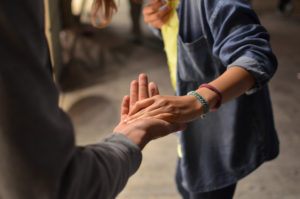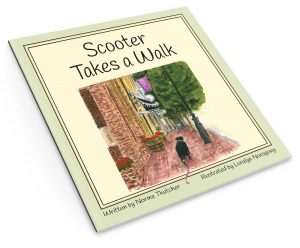
Photo courtesy of Remi Walle/Unsplash
An article in Real Simple magazine of March 2014 told the story of four women who are legally blind. The story’s focus was two-fold:
1) the difficulty of being a mom when you’re without sight
2) the tremendous benefits of being part of a support group
The article caused me to consider what life as a sightless mother might be like. How could one meet the threshold of many people’s sense of an “ideal” mother? Besides the cornerstone mothering mission of protector, what about all the daily stuff—bathing the baby, reading bedtime stories, driving the kids to activities, fixing meals, reading and signing permission slips for field trips?
Becoming a mother is frightening on its own. Add in the lack of ability to see a child’s face causes me shame for all the minor parenting issues I complained about when my children were young.
The group in the article was formed in 2013 when some women attended an alumni meeting sponsored by Guide Dogs for the Blind. One of the women had taken her five-month-old son with her. Although no one could see the baby, they heard him, and that set off the usual reaction: Everyone wanted to hold him and love on him.
Among those eager to cuddle the baby was a young woman halfway through her own first pregnancy. She had a zillion questions for the baby’s mom, such as how do you hold your baby and hold onto the guide dog at the same time? And so the new group Mommies with Guides was formed. I love the name and assume it refers not only to the guide dog that each mom has, but also to the human guides!
One of the bonds between the women is giving help and advice. Been there, done that. It’s not a big deal. Here’s what you do.
A second bond is loving and losing their guide dogs. Research shows that a guide dog spends the first two years of its life being trained before being assigned to an owner. Then as long as the dog stays healthy, it can fulfill its purpose as a service dog for about seven years.
Most of us know how hard it is to lose a dog that has been part of the family. Consider what it must feel like to lose a dog who has not only been family but also your eyes, your protector.
A guide dog is of utmost importance so these moms experience the sad lesson of having to let go when a dog can no longer serve. And then they learn to work with and fall in love with the next dog. Here’s what one mom said: “It’s like having kids. You can’t imagine loving another one as much as your first. But you do.”
The third bond is what I call “friends with empathy benefits.” The moms stated that being blind makes them high maintenance for the rest of their family. So they try not to complain until they’re with their group. Who else can better understand their common issues such as people who try to pet the service dog when it’s working which can distract the dog.
They are THERE for each other. One woman, Joy Ross, was quoted as saying, “We’re in awe of each other…each of us has mastered a skill or has a bravery that the others don’t.”
We should all be so blessed.
To my readers: If you are (or have been) part of a support group, tell us about the most important bond you share with the others.



